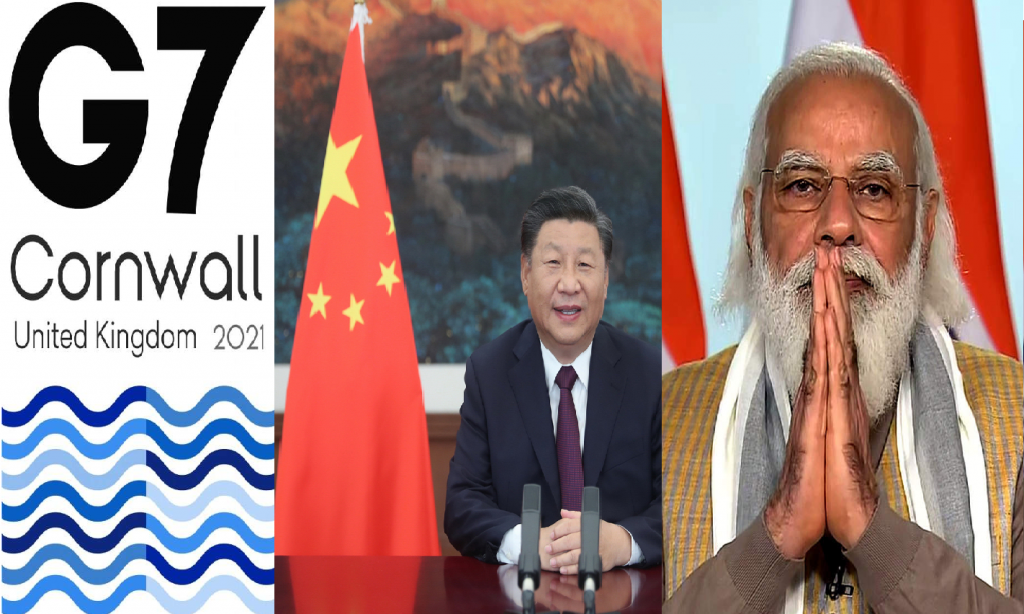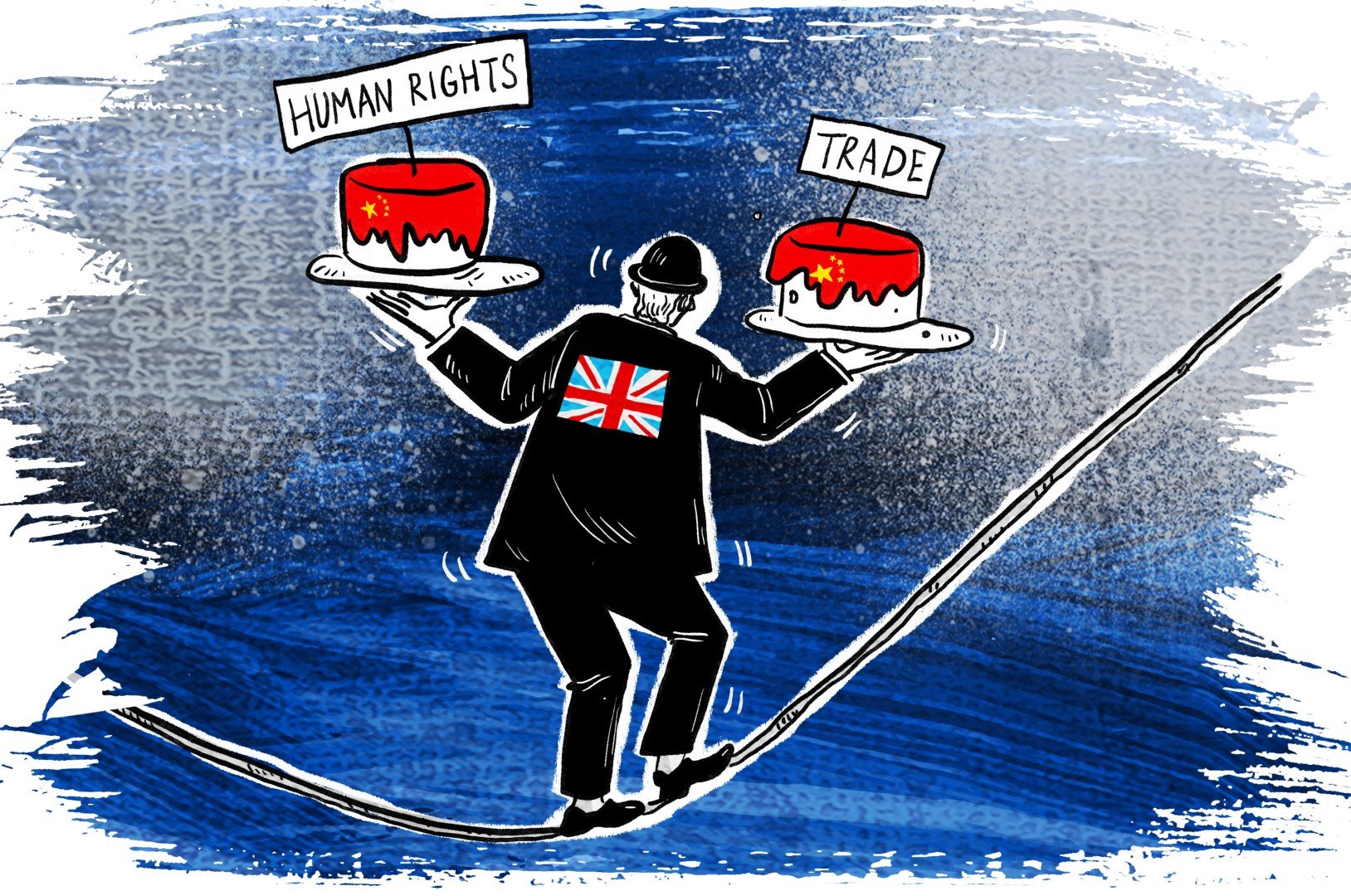
- The G7 led has announced Build Back Better World(B3W) partnership. This is regarded by many experts as an alternative to China’s belt and Road initiative.
- G7 has taken note of many other actions of China. They have even made many direct references to China of its authoritarianism and aggression.
- G7 has also proposed possible expansion of this grouping most likely with the addition of India, Australia, South Africa and South Korea.
- With vaccine exports of India it has shown its large heartedness and concerns for world development and staying true to its belief of Vasudeva Kutumbakam.
47th G7 summit was held recently in United Kingdom. Prime Minister Narendra Modi was invited to participate virtually as a guest by the United Kingdom, which holds the presidency this year. This is the second time he is attending the conference during his tenure. Former Prime Minister Dr Manmohan Singh had attended the summit five times. This shows that respect India and the summit has towards each other and geopolitical influence it holds in this world.
G7 or group of seven is an intergovernmental political economic forum of world’s seven largest advanced economies and liberal democracies. This was constituted in 1975. Members of this group include UK, Canada, France, Germany, Italy, Japan and USA. Although European Union is not a member, it is usually a part of G7 summit. This grouping is significant as these countries together account for around 40% of the global GDP and 1/10th of the global population.
Background of G7
The collapse of Bretton Woods fixed exchange system in 1971 and global oil crisis in 1973, shook the whole world economy. This disruption forced the six leading industrial countries to meet together to discuss the global economic situation. Initially it was G6, where the heads of states and the governments met annually. Canada was included in 1976 as it was the seventh largest economy then. Later European union community was also given representation but was not included as a member.
During the following decade G7 started expanding itself from just an economic partnership to dealing with foreign and security policy issues. In 1998, after the collapse of USSR The remnant Russia was also invited as a member, thereby becoming G8. But in 2014, Russia was excluded from the group following its annexation of Crimea and interference in Ukraine in violation of international laws. Since its origin it has dealt with many global financial and security challenges.
In 1997 it set up a fund to help Ukraine to deal with Chernobyl nuclear disaster. It helped in establishing G20, in 1999 for better engagement with developing nations. Global Apollo program was supported in 2015 to promote clean energy research and development. G7 in this summit discussed wide range of issues. Interestingly China was on its agenda.
The China Challenge

This year, the G7 led by United States of America has announced Build Back Better World(B3W) partnership. This is regarded by many experts as an alternative to China’s belt and Road initiative. The belt and Road initiative is an ambitious project of China, which has invested more than $1 trillion to revive ancient trading routes with China as it is focal point. Under this project it is building silk Road economic belt, land-based corridor of rails and roads and maritime trade route with Asia, Africa and Europe. This has increased its economic and strategic influence.
Western observers allege China is engaging in ‘debt trap diplomacy’ through these projects. It is alleged that China is pushing commercially unviable projects at strategic locations in smaller countries. These are funded by providing loans by China to these smaller countries, which are tracked and by the investments and loans. Eventually when the project commercially fails and the small countries are unable to pay the loan back, they fall into debt burden. Then these countries are forced to hand over the project to China on long-term basis. Hambantota port is the best example for this, which China has obtained on a 99 year lease at a strategic location in Indian Ocean.
G7 has even taken note of many other actions of China. They have even made many direct references to China of its authoritarianism and aggression. China was specifically referenced over violation of human rights and fundamental freedoms specially freedom of speech and expression. G7 criticised China for its policies in Xinjiang province where it is seen to be targeting the Uyghur Muslims. In the pretext of de-radicalisation and re-education, China has carried out unspeakable acts including sterilisation and persecution.
G7 has taken note of other actions of China apart from its debt-trap diplomacy. G7 has made direct references to China of its authoritarianism and aggression. China was specifically referenced over violation of human rights and fundamental freedoms specially freedom of speech and expression.
G7 has also taken note of the draconian laws passed in China regarding Hong Kong to repress democracy, which was assured by China to United Kingdom when Britain give freedom to Hong Kong. Dual system was agreed upon that the main land China doesn’t interfere in the democratic process of Hong Kong. Concerns regarding the aggressions of China on Taiwan and and other ASEAN countries in South China Sea was also raised in some.
In the dispute between China and sovereignty of Taiwan and maritime sovereignty of many other countries in South China sea, the latter is being supported by G7. They had long discussions regarding the origins of the Covid 19. Recently, origin of virus is back in the news, as the lab Leak theory, has started gaining ground. Many experts are considering the possibility of Covid19 not being a natural mutation, rather a leak in the wuhan lab. Lot of credible evidence is an emerging to indicate this theory, so many experts who were sceptical of the lab leak theory disregarding this as a conspiracy theory are now forced to acknowledge the credibility with the emergence of new evidences.
Expanding G7 and India’s role

G7 has also proposed possible expansion of this grouping most likely with the addition of India, Australia, South Africa and South Korea. This is also one of the reasons that these countries are invited as guest participants. The common factor binding these nations being democracy and opposition to authoritarianism. With the advent of corona virus and its economic impact, the world has become wary of problems of being over reliant on China for its manufacturing of goods. Japan, one of the members of G7 even announced a economic incentive for the companies willing to shift the manufacturing from China to other countries.
Repeated military crisis in the northern frontier has compelled Delhi to re-evaluate its threat perception regarding China. China is the only nation blocking India’s membership in United Nations Security Council (UNSC) and Nuclear Suppliers Group (NSG). Recent incidents in Ladakh including the Galwan clash has only made India more cautious to limit its exposure to Chinese technology and investments. The growing trade deficit with China and its negative impact on domestic market was one of the primary reasons for India to come out of Regional Comprehensive Economic Partnership (RCEP). Therefore India is turning towards the western countries for trade agreements, where it can emerge as a critical partner in the future global supply chain to the democratic world.
The recent development of corona vaccines and manufacturing speed has shown the capabilities of India to the world. With its huge Human Resource India hopes to emerge as an better alternative for the world to China in the manufacturing sector.
The recent development of corona vaccines and manufacturing speed has shown the capabilities of India to the world. With its huge Human Resource India hopes to emerge as an better alternative for the world to China in the manufacturing sector. India has many bilateral differences of opinion with western countries on many of the issues like role of state in economic order or privacy and information policies. But the Summits like G7 can be a prolific platform for countries to converge at a mutually beneficial agreements.
India has also lot of ideological similarities with G7. India has always been keen in actively participating in these geopolitical summits with the intention of promoting greener and sustainable growth, reforming global order, constructing sustainable supply chain and combating climate change. India has always insisted for re-formation in global institutions in line with the modern and updated geopolitical realities. With vaccine exports of India it has shown its large heartedness and concerns for world development and staying true to its belief of Vasudeva kutumbakam.
India has shown support to the G7 against raising authoritarianism and extremism and creating better environment for all the countries to flourish. This summit arrives approximately one year anniversary of China’s aggression in Galwan Valley. G7 is beneficial to India in defending against expansionist ambitions of China. This along with the quad India hopes to form alliances with like-minded countries with global aspirations of sustainable development.
Shreyas has an M.Sc. in Psychology and serves in NIMHANS. He writes regularly on politics, society, international affairs and technology. Views expressed are the author’s own and do not necessarily reflect the views of SamvadaWorld or its staff.
